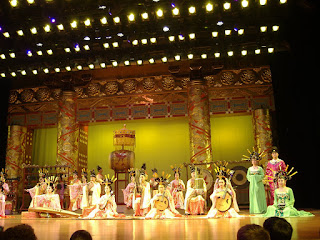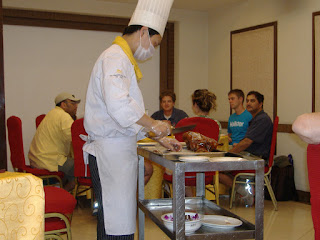
Today’s agenda included Tiananmen Square, the Forbidden City and the Temple of Heaven. I still couldn’t get over the size of Beijing. Skyscrapers were everywhere. If you didn’t see high rises, you saw high rise cranes that dotting the sky and no doubt constructing what would one day be a high rise. Someone mentioned that 70% of the world’s high-rise cranes are located in China. You can see economic growth all around you.


Our first stop was the Temple of Heaven. It was basically an altar for the past emperors. Sacrifices were performed and prayers conducted, but this wasn’t your average layman’s temple. I’m not sure how big the emperors were, but I doubt they needed an altar the size of 2 football fields, which is an approximate size of the temple. It also was very elaborate so it wasn’t as if you had this huge, plain temple.

The area around the temple was very lively. We walked through a park area and Chinese people were dancing, playing games, singing and having a great time. I wanted to join in on the fun. They did invite us to join in one game they were playing. I didn’t get the name of it, but it’s like playing hackey sack with rackets. You had to catch the ball on the racket in a sweeping motion that absorbed the energy of the ball and allowed it to remain on the racket. I was able to pick it up pretty quickly, but others in the group had a tougher time. It was the first time that I saw the Chinese people relaxing and displaying some emotions. Normally, they are hard at work or bustling to and from work. Most Chinese, especially the older generation, were raised to conceal their emotions. They value harmony. Therefore, they tended to wear a stoic mask-like expression that hides their feelings. The expression tends to be neither joyous nor sadness, but somewhere in between. In my opinion, the expression tends to lean more toward the serious or stern side as opposed to happy.


The next stop was the Forbidden City. This was where the emperors lived and only their family and friends were allowed inside this fortress. It's complete with a wall on all sides. The entryway was designed to be awe inspiring and the architects succeeded. The threshold of the entry es raised and men are supposed to cross the threshold with their left foot and women with their right. I forgot the reason, but I think it was for good luck. The entryway is massive and succeeded in making you feel insignificant. You definitely know that you're visiting someone of high stature when you walk through the entryway. It empties into a wonderful courtyard garden with multi-century old gnarled trees and stone statues. So this is how the emperors lived. Walking through the city, you get a sense of the country’s rich history. No other place on earth can offer this kind of experience.



It was also at the Forbidden City that I witnessed a forbidden act by American standards. However, I'm in China and it is perfectly acceptable here. In the Chinese culture, pampers aren’t popular due to their cost. As a result, most toddler’s don’t wear them. Instead, pants are designed with a split along the inside seam. Whenever a young child has to answer nature's call, they simply squat and relieve themselves on the sidewalk, gutter, etc.. Well, this was precisely what I witnessed before we entered the Forbidden City. On a crowded sidewalk, a little Chinese boy squatted down and urinated on the sidewalk close to our group. An Asian friend prepped me for this possible occurrence, but the rest of my group wasn’t prepared. They parted like the Red Sea, and the poor youngster immediately lost his human privacy screen. There he was exposed to the masses, but he didn’t seem to mind as he continued to sprinkle the sidewalk. The Chinese culture is sometimes very different from our Western culture.
Since I jumped to the subject of relieving oneself, I should mention that some toilets in China are different from Western style toilets. These toilets are in the ground and your bottom doesn’t touch the toilet. I would describe it as the U-shaped toilet lid over a hole in the ground. To use this type, you have to squat over the toilet. I wasn’t adventurous enough to try the Chinese toilet, but some women in our group mastered it. The men’s restrooms have standing Western style urinals as an option. Unfortunately, the public restrooms for women didn’t have Western style options in some cases so the women were forced to do as the Chinese.


As you leave the Forbidden City, it empties into the infamous Tiananmen Square. The world knows so much about this Square because of the student protests and bloodshed that occurred in 1989 and were broadcast worldwide. Ironically, I learned that the world probably knew more about the Tiananmen Square massacre, as some dubbed it, than the Chinese citizens in the country where it took place. Our tour guide, Sarah, brought this to our attention. Sarah is probably in her early twenties since she said she was very young at the time of the Tiananmen Square incident. Consequently, she only has a general understanding of what happened at Tiananmen with the student protests. Since China is a Communist country, the government controls the media and the nation isn’t exposed to the full details of the tragedy unless they witnessed it or got the details from someone that did. People that were young or born after the tragedy don’t know the full details of the event and can’t get information pertaining to it because the government doesn't allow it.

Speaking of Communism, I was constantly reminded of the government’s presence when I talked to my wife, Crystal, each morning on the phone. I sometimes heard a clicking sound on the line, which reminded me that although my hotel room could’ve been in the U.S., I was definitely not on U.S. soil, and didn’t enjoy freedom of speech. Initially, I didn’t know what the clicking sound was, but the expatriate attorney, Michael Lovell, confirmed that the clicking was wire tapping from the government. I had to admit that it made me a little paranoid. I also started noticing cameras, but I didn’t know if I was paranoid at that point or if they were routine security cameras. I saw some cameras in the hotel elevator and in Tiananmen Square, but I didn’t recall seeing them in other public places. It probably was paranoia. It did give me a new appreciation for the freedoms that I take for granted. Even with my newfound patriotism, I don’t feel that a democracy is necessarily best for China. With such a large population, the government has a huge responsibility to maintain order and stability in the country. For the most part, this has been accomplished through central planning. Of course, everyone isn't happy with the current form of government. Likewise, there would be Chinese citizens unhappy with a democratic government. Since you can't please everyone, you have to do what's best for the majority. A balance between socialism and democracy is where the country is headed and probably will work best.


That night I tried a Chinese massage. It was a great experience and a real bargain. A one hour, full body, deep tissue massage was 140 yuan or roughly the equivalent of $17. That was ridiculously inexpensive when compared to massage fees in the U.S. that can cost a $1 a minute. I went with a small group and we found a place around the corner from our hotel. It was an upscale and professional outfit. In fact, the masseuse didn’t touch me directly except for my head massage. The majority of the massage was performed through thin pajamas that were provided. The pajamas did not degrade the effectiveness of the massage by the way. The next day I had some mild muscle soreness, but overall, I felt great.
Later, I went with a small group to club Banana. I wanted to experience the club scene in China, but since I don’t frequent clubs in the U.S. anymore, I felt a little like a “fish out of water”. It didn't help that Club Banana is a techno dance club. I never frequented that type of club even when I went to clubs back in the day. I could've adjusted, though, if I were ten years younger. There were go-go dancers suspended on platforms above the crowd; foam falling from the ceiling; and a provocative pole dancer that performed on the main stage. For a Thursday night, the place was packed. Everyone was shoulder to shoulder and you could hardly move. For some reason, the lack of space didn’t stop the young crowd from dancing wildly to the techno trance music. Arms, torso, head, and hair were whipping around to the techno beat. This was definitely not the place for the claustrophobic. I was surprised that more people didn’t get injured by a stray elbow or arm. On the dance floor, the dancers managed to keep their free flowing expression of dance confined to their personal space and no one got hurt. A guy behind me at the entrance wasn’t so lucky. As I paid my cover at the club entrance desk, I backed away slightly from the desk and turned to walk into the club. I think the guy behind me moved forward to pay at the same time. Anyway, we had a slight collision. He got the worst end because the back of my head hit him in the lip.
At the end of the night, five people, Alex, Van, Brianne, Nashae, and myself, piled into a small cab designed for three passengers (two in the backseat and one in the front). Apparently, the cab driver wasn't paying attention to the number of people that climbed into his cab. We had four crowded into the backseat and one sitting up front. The driver became a little animated once we got to the hotel. We didn’t know what he was complaining about, but Van, whom is Vietnamese and can speak some Chinese, translated for us. She said that he wanted to know why there were so many people in the back of his cab. We kind of shrugged and gave him a pitiful “I’m sorry” expression. He seemed upset that he unknowingly transported so many people in his cab. I couldn’t believe he didn’t notice until we got to the hotel. The look on his face was priceless, though. It wasn't as if we tried to deceive him. We instinctively piled into the cab the same as we do in the U.S.. Maybe they frown on that type of behavior in China because he seemed a little pissed off with us. We didn't cover China cab etiquette in my Chinese business course. Anyway, the damage was already done at that point. We paid the cab fare and had a good laugh about it later in the hotel lobby.





































